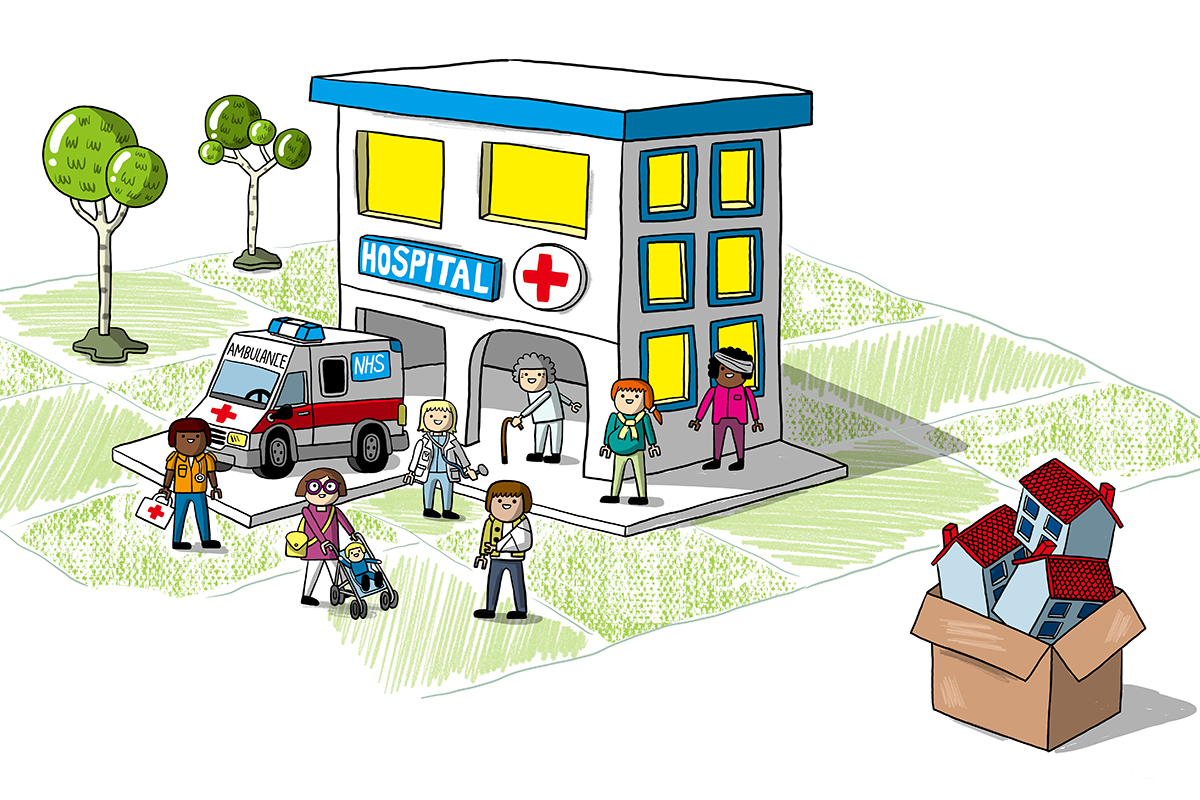You are viewing 1 of your 1 free articles

On health, housing and care, party politics needs to come second
Joining up health, housing and care often seems a step too far, but we should not forget the size of the prize, writes Clare Tickell
Ever since my university days when I wrote a passionate, and probably not very good, essay about how housing policy needs to be considered alongside health and social care policy if systemic improvements to the poorest people’s lives are to be made, it is exasperating that this great truth still has not gained wider traction.
As pressures on health and social care systems increase as people live longer and demand grows, it is even more obvious.
Health, social care and housing all face crises.
Much thought and politics is going into how these can be better aligned. This, in itself, is a classic wicked problem.
Putting aside resources, the drivers, language, performance indicators and time frames in health differ significantly from those in social care.
A doctor’s job is very different from a social worker’s job, particularly given that the latter is often as a commissioner rather than a provider.
Finding time and space to explore how best to work together when services are facing such pressure is fiendishly difficult on the frontline where change happens.
While the shortage of money and exponential increase in demand makes it vital this takes place, the reality is that these create disincentives and even cost shunting which undermines trust.
The government has recognised that health and social care are indeed in crisis and, hopefully, the Health and Social Care Green Paper, due to be published this summer, will have serious, sensible proposals for addressing current failures.
This is one of the stickiest, most political issues of our time.
New Age UK research on older people shows vividly their frustrations with the social care system.
Meanwhile, costs are increasing – the Fabian Society has predicted a £10bn shortfall in spending for older people’s support needs on social security, health, social care and housing.
Conservatives and Labour appear a long way apart. There is talk from government of combining health and social care personal budgets, presumably partly in an attempt to use choice as a disruptor of markets.
While politically unsurprising, the transfer of risk to individuals, who are ageing and in poor health and their families, of course, would carry significant risk.
“This issue must be taken out of the political dogfight to make meaningful progress.”
Labour’s manifesto commitment to a National Care Service looks to be markedly at odds with the move to devolved health and social care budgets and how this might be worked through is far from clear.
Last month 102 MPs from across the political spectrum wrote an open letter calling for a cross-party approach to health and social care funding – tacit acceptance that this issue must be taken out of the political dogfight to make meaningful progress.
And so to housing.
While there is political agreement that the housing shortage is acute with a shared urgency to finding solutions and increasing supply, this debate is often a polarised one concentrating on increasing social housing or increasing homes for sale.
What politicians don’t show signs of doing is standing right back and looking at where people are in their lives, what housing they can afford and possibly learning from other countries.
This matters: what is desperately needed is a debate along these lines where party politics come second.
“Labour’s manifesto commitment to a National Care Service looks to be markedly at odds with the move to devolved health and social care budgets.”
Unlike health and social care, however, there seems to be no declared appetite for this in parliament.
It is likely that this one will continue to run while pressure grows.
Housing that young people can afford and private rented stock that is habitable and safe will be in increasingly short supply, nudging the issue up the agenda until, eventually, steps are taken to address the systemic problems that underpin housing policy, but it is unlikely that this will take place any time soon.
This does not mean that we will stop doing the very important work that housing associations are doing; rather that policy direction and incentives that would make it easier and quicker will not be there.
“Good-quality, well-designed housing for everyone, which encourages a sense of community and promotes a sense of well-being, can take pressure off public services.”
It is little wonder, given this context, that asking people to engage in the opportunities afforded by joining up health, housing and social care seem a step too far.
This doesn’t mean that we should forget the size of the prize.
Good-quality, well-designed housing for everyone, which encourages a sense of community and promotes a sense of well-being, can take pressure off public services and, for older people, this can mean living independently and happily for much longer.
It also means we should be looking out for opportunities to demonstrate the great truth that these three areas belong together.
Below the radar there are doctors, social workers and housing managers who just get on with this.
We should all celebrate and shout about this when we see it. Perhaps then we can actually help make change happen.
Dame Clare Tickell, chief executive, Hanover











